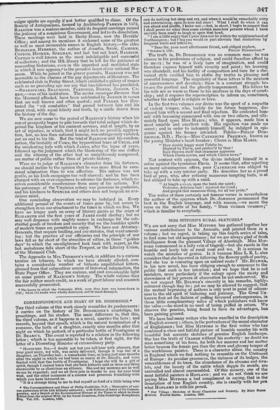CORRESPONDENCE AND DIARY OF DR. DODDRIDGE.*
THE third volume of this work closely resembles its predecessors : it carries on the history of DT. DODDRIDGE'S courtships, his preachings, and his studies. The main difference is, that this, the third volume, as it happens in a novel, marries the hero ; and records, beyond that epoch, which is the natural termination of a romance, the birth of a daughter, exactly nine months after that night on which he partook of a particular bottle of Frontigniac at Dr. BEARD'S. This event is reported to a relation in the following letter; which is too agreeable to be taken, at first sight, for the letter of a Dissenting Minister of extraordinary piety.
"HONOURED Sia,—I doubt not but you will hear with pleasure, that your good niece, my wife, was safely delivered, though it was but of a daughter, on Thursday last; a remarkable time, as being just nine months after the night in which we had been so merry at Dr. Beard's, and were feasted with that fine bottle of Frontigniac. I hope she will be a girl of spirit, though I cannot learn that she hath hitherto said or done anything answerable to so illustrious an alliance. She and my mistress are as well as can be expected; and we all three join in thanks to you for your kind visit, and the other instances of a sincere and generous friendship with which you have favoured us.
"It is a strange thing to me to find myself so fond of a little being who * The Correspondence and Diary of Philip Doddridge, D.D. ; illustrative of vari- ous particulars of his Life hitherto unknown ; with Notices of many of his Contem- poraries, and a Sketch of the Ecclesiastical History of the Times in which he lived. Edited from the original DISS. by his Great Grandson, John Doddridge Humphreys, Esq. Vol. III. London, 1830. can do nothing but sleep and cry, and when it would be remarkably witty and entertaining, open its eyes and stare ! What I shall do when it can run about and prattle, I know not ;—but, in short,1 begin to suspect that I shall prove no wiser than some certain nameless persons whom I have secretly been ready to laugh at upon that head.
"I am a little angry that Upton does not lie within the neighbourhood of Northampton; but I begyou would in part alleviate that misfortune by frequent visits and letters to,
"Dear Sir, your most affectionate friend, and obliged nephew, "October 9, 1731. PHILIP DODDRIDGE."
The truth is, Dr. DODDRIDGE was no common man : he was sincere in his professions of religion, and could therefore afford to be merry ; he was of a lively turn of imagination' and could therefore express himself with vivacity and point ; his learning was abundant, and his facility of composition and turn for a rhe- torical style enabled him to clothe dry truths in pleasing and powerful language. The singularity of these letters is the mixture of amorousness and devotion : there is a constant struggle be- tween the poetical and the ghostly temperament. His letters to his wife are as warm as those to his mistress in the days of court- ship ; and it requires the superscription to inform us, sometimes, whether his subject is religion or love.
In the first two volumes our divine was the sport of a coquette of violent temper, who, luckily for his future happiness, dis- missed him with a second and final rejection. He contented him- self with becoming enamoured with one or two others, and ulti- mately fixed upon Miss Maim ; who, it appears, made him a most amiable and excellent wife. His rejection was made no secret; and in order to indemnify himself, he indulged in epi- grams against his former intended. Fidelio—PHILIP Don- DIMS GE, ; Flavia.—Miss CATHERINE FREEMAN, known as the young Minister's heart-breaker; Cleora is Miss Maws.
"How doubly happy must Fidelio be, Slighted by Flavia, and preferr'd by thee ! Sure Heaven itself that character approves Which Flavia scorns, and which Cleora loves."
Not content with epigram, the divine indulged himself in a satire against the tyrannous Flavia. It seems that, after rejecting so many advantageous offers, poor CATHERINE was obliged to take up with a very inferior party. He describes her as a proud bird of prey, who, after refusing. numerous tempting baits, is at last obliged to take up with a snail.
"At length a SNAIL upon the bank she spied ; Welcome, delicious bait ! rejoiced she cried ;
And gorged that nauseous thing, for all her pride."
The writer of these certainly not famous verses is nevertheless the author of the epigram which Dr. JOHNSON pronounced the best in the English language, and with reason,—we mean the verse on the motto of his family, " Dum vis-imus vivamus which is familiar to everybody.


























 Previous page
Previous page